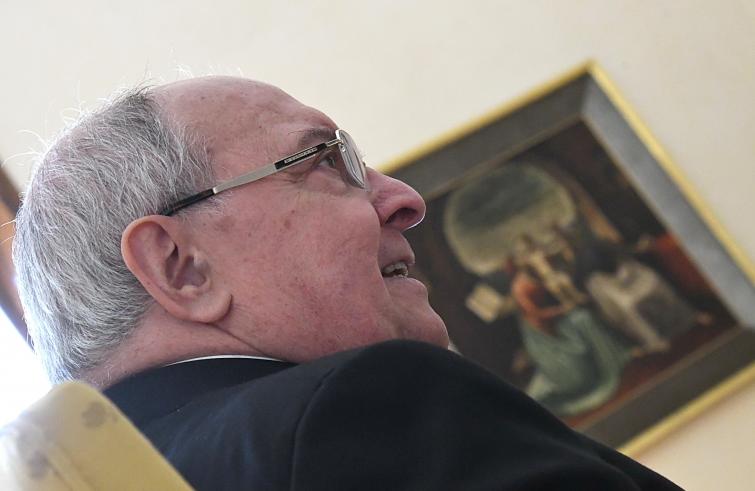
“The Mare Nostrum is not a wall but a bridge for all Christian and non-Christian realities that border on its shores” Cardinal Leonardo Sandri, Prefect of the Congregation for Eastern Churches told SIR. The event of reflection and spirituality “Mediterranean, frontier of peace”, will take place in Bari from February 19 to 23, on the initiative of the Italian Bishops’ Conference (CEI). “I am grateful to CEI for this initiative – said the Prefect who will be attending the meeting in Bari – involving many pastors of our Oriental Catholic Churches. The aim is to offer a synodal occasion to gain awareness on the magnitude of the problems that the Mediterranean area is confronted with, notably the humanitarian crisis of migrants who leave their lands as a result of wars, instability, poverty, and seek a safe haven of peace”. His Eminence expressed the hope that
“the Mare Nostrum may not be a wall but a bridge”
“connecting all Christian realities bordering on its shores. As Christians, as Catholic Churches, we are called to work towards reaching out to our brothers and sisters of other religions.” The Prefect’s thoughts go to ” the people from the Middle East, mostly Islamic, and from Africa”, in particular “to Eritreans and Ethiopians who in large numbers try to reach our shores attempting to cross a wall of water. The purpose of the Bari meeting is “to raise awareness on the crisis affecting this region and the response we are called to give as Christian communities and Churches in compliance with established rules.”
Your Eminence, bishops and patriarchs of the Oriental Rite Churches, with all their heritage of faith and traditions, will be present in Bari. What contribution can these Churches offer to the meeting?
First of all it must be remembered that they are pastors of Churches decimated by wars, as in Syria and Iraq, by political and economic disasters, victims of abuse, persecution and violence. Churches of countries where co-existence is not an ‘option’ but a mandatory condition, called – as they are – to co-exist with other religions such as Judaism and Islam, and with Christian-Orthodox brothers and sisters and other denominations. They will bring to Bari their experience of the Word shared at an ecumenical level, along with the suffering of discrimination, persecution, the limitation of freedom, and the flight of Christians. I believe that this will be their personal contribution of direct and living witness offered to the Western pastors.
Citizenship, religious freedom and inequalities are among the items on the agenda…
I believe that the Document on Human Fraternity for World Peace and Living Together, signed on 4 February 2019 in Abu Dhabi by Pope Francis and the Great Imam of Al-Azhar, Ahmad Al-Tayyib, will serve as a point of reference for the conference, highlighting the importance of dialogue, cooperation and mutual understanding. The world we look forward to is one based not on division and separation but on unity and fraternity, since all the inhabitants of these countries are citizens in their own right.
“To live as Christians is a right. We don’t ask for privileges.”
“All we are asking is to be granted the same rights and duties as others. Working as one to help create a world for the good of the people without distinction of ethnicity, opinion, faith, political ideas. A world where access to education, housing, health care, employment is possible for everyone, where young people can form a family, where the dignity of women is defended. I would define it a great spring of the Mediterranean.”
In Bari, along with Oriental rite Churches, there will also be many faithful of the diaspora who now face their countries from the northern shore of the Mediterranean, i.e. the western countries where they are living. Will there be room to address this theme?
It’s a subject that we have very much at heart. Once again we are grateful to the Italian bishops for their generous welcome and the possibility offered to the faithful in the Diaspora who have their churches and priests. The same also happens in other countries like France and Spain. The request put forward by the Patriarchs is that they may also have their own bishops. The Oriental Patriarchs share the feelings of responsibility for their faithful in the Diaspora who went from being inhabitants of the Middle East to permanent observers from the West where they found appropriate shelter, a job, a home, a family.
The Patriarchs would gladly welcome, for these faithful in Europe, the possibility of granting them bishops and not only ordinaries or apostolic visitors. It would be a sign of profound pastoral consideration.
The bishops are faced with a considerable challenge: “To pass on the faith to future generations”. This question is shared by the two shores of the Mediterranean. It is a matter of extreme urgency for the Churches overlooking the Mare Nostrum…
The faith must not perish in the Mediterranean. The survival of the Christian faith and the Catholic Church is a major challenge. Young people risk being overwhelmed by the dominant culture of the prosperous shores of the Mediterranean and thus lose their faith by drowning in our liquid society, devoid of stable values.
If people stop believing in the divinity of Christ, in the Catholic Church, in salvation, in death as a passage towards the encounter with God the Father, it will be a great misfortune. But some initiatives have already been undertaken: in the eparchy of Piana degli Albanesi the bishop initiated Byzantine catechism for young people along the traditional lines of Eastern spirituality. Young people and the survival of the faith are, in my opinion, the challenge that all the pastors of the Mediterranean should take to heart.










